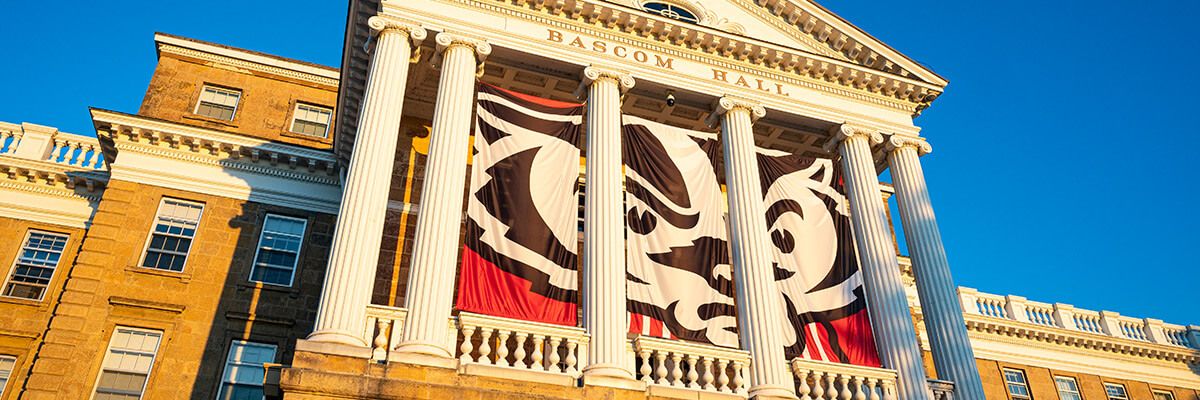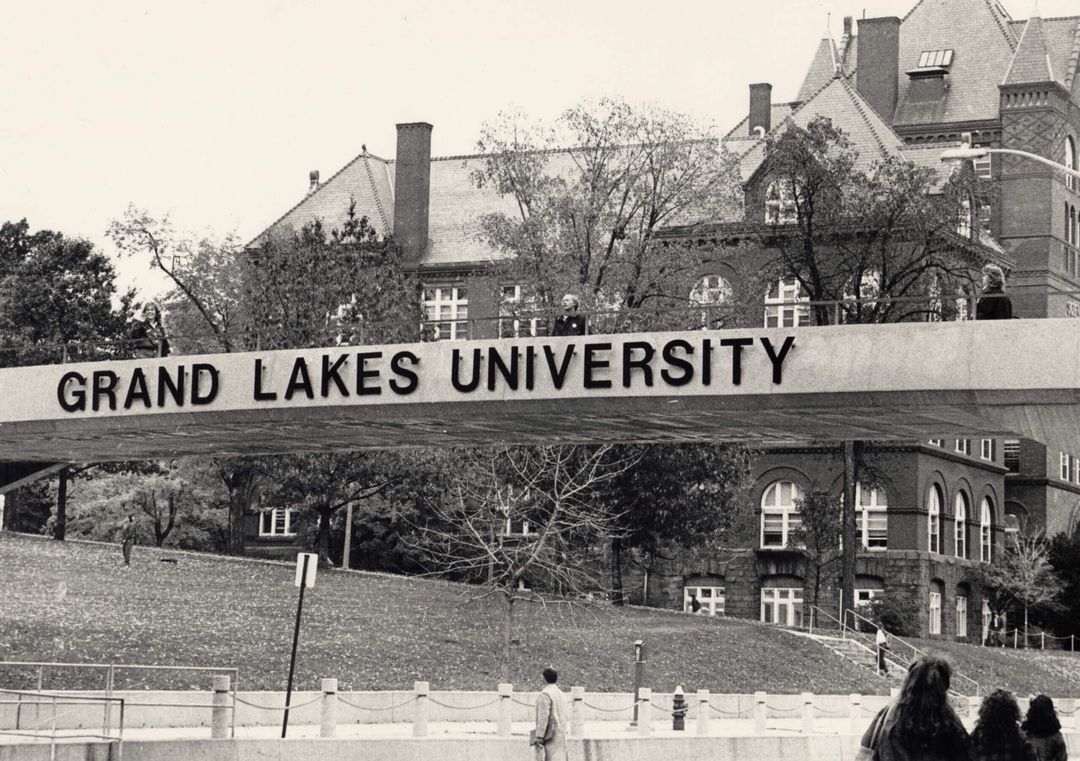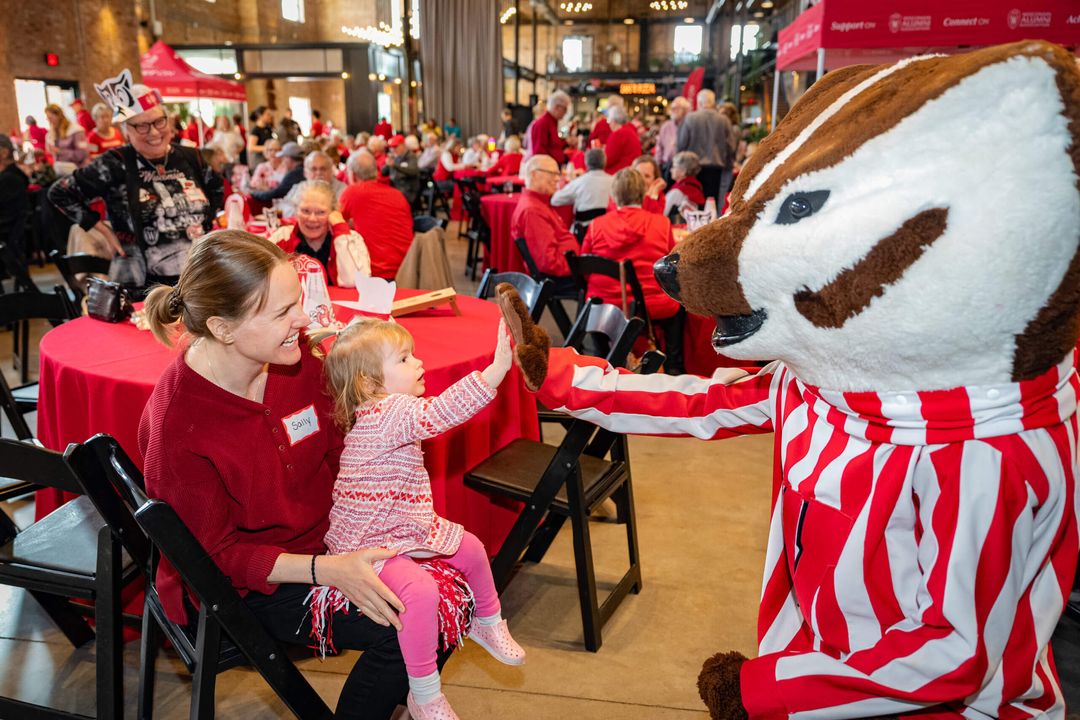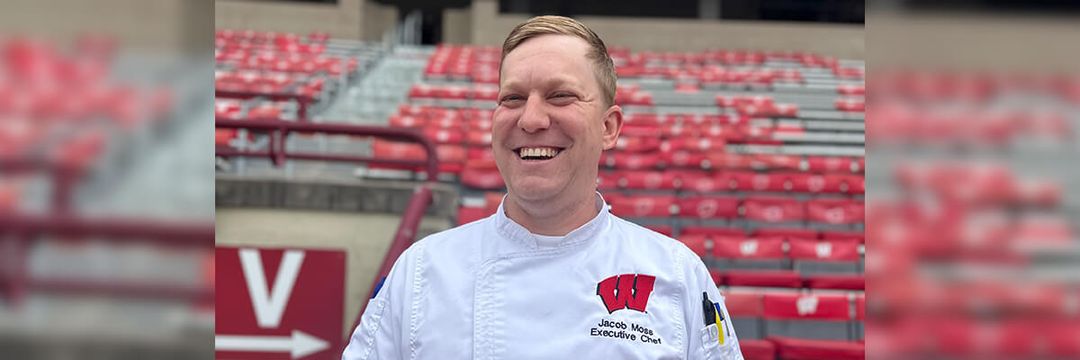Support future generations of Badgers with a gift to the WAA Scholarship Fund
Make a GiftFebruary 2026
Q: In 1921, the Edwin Booth Dramatic Club of the University of Wisconsin premiered the film Not Responsible, which they advertised as the first-ever student-produced movie. The film features a budding romance, a fur coat, a mistaken identity, and a high-stakes scene involving which winter activity?
A: Ice-boat racing. UW student Jack enters an ice-boat race in hopes of using the prize money to buy a new fur coat for Betty, whose first coat he ruined with a spilled bowl of cereal. When Jack’s foe prevents him from competing, Jack’s sweetheart, Rosa Bell, jumps into his skiff and sails to victory. The film was advertised as the “only photo-drama ever initiated by an undergraduate body,” an accolade also claimed by the Thyrsus Drama Club at Washington University in Saint Louis for their 1916 film, The Maid of McMillan.
January 2026
Q: What is the coldest place on the UW–Madison campus? (Hint: It’s not the bus stop in January when the 80 is running late.)
A: The coldest place on campus — spring, summer, fall, and winter — is a 0.5 cubic millimeter space in Chamberlin Hall where the temperature drops to 500 nanokelvin, or -459.6699991 degrees Fahrenheit. This space exists in a vacuum chamber in the lab of physics professor Mark Saffman, whose work making atomic clocks requires the supercooling of strontium atoms by way of lasers.
December 2025
Q: Today, December 11, is the official study day before final exams, and Memorial Library’s carrels, or “cages,” are booked with students hitting the books. How many of these classic UW study spots are stashed among Memorial Library’s stacks?
A: According to Rebecca Payne, instruction coordinator and public services librarian at Memorial Library, there are 302 carrels, or “cages,” in Memorial Library. Of these, 175 can be assigned as “graduate carrels,” in which grad students can stash their study materials for semesters at a time. The rest are up for grabs — though, at present, most likely occupied by Badgers tackling the last academic tasks that stand between them and winter break.
November 2025
Q: The Camp Randall Memorial Arch, which honors the troops who trained at Camp Randall between 1861 and 1865, is adorned by three figures: a young soldier, an older veteran, and an eagle. Which of these sentries is modeled after a specific Civil War hero?
A: The eagle. Old Abe was an American bald eagle who served as a mascot for the Eighth Wisconsin Volunteer Infantry Regiment during the Civil War. As the story goes, upon his arrival at Camp Randall in 1861, he became so excited by a band’s rendition of “Yankee Doodle” that he took a corner of one of the flags carried next to him in his beak and began flapping his wings. Old Abe accompanied his unit in more than 30 battles and returned to Wisconsin a beloved war hero, living out the rest of his days in the Capitol. When he died of smoke inhalation from a fire in 1881, Civil War veterans from around the state served as pallbearers at his funeral.
October 2025
Q: Early UW Homecoming celebrations featured an annual bonfire on campus, save for those held during World War II, during which the bonfire was replaced with what event in support of the war effort?
A: Between 1942 and 1945, the Homecoming bonfire was replaced with a Campus and Community Scrap Drive. The event raised $1,000 (around $20,000 in today’s economy) for the University War Memorial Fund.
Q: According to the lore of one of the firm’s founding families, a bee farm on UW–Madison’s Picnic Point played a key role in the 1901 establishment of what Wisconsin classic company?
A: According to the Davidson family, Harley-Davidson Motorcycles began with the help of $500 in venture capital supplied by Arthur, Walter, and William Davidson’s “honey uncle,” who owned a bee farm on Lake Mendota. That farm was part of the land that the UW eventually acquired in 1945 and is now known as Picnic Point.
August 2025
Q: In 1961, Charles Sanna ’39 invented Swiss Miss, the world’s first instant hot cocoa mix, in order to make use of which wartime surplus?
A: Powdered coffee creamer. Sanna’s family company, Sanna Dairy Engineers, supplied the U.S. Army with powdered coffee creamer during the Korean War. In meeting their contract with the military, they overproduced, leaving Sanna to get creative with the leftovers. He experimented with the mix in his home kitchen in Menomonie, Wisconsin, and relied on his children to taste-test until he landed on the recipe that launched the world’s instant, water-mixed, hot chocolate industry.
July 2025
Q: It’s busy season at the Babcock Dairy Plant as its signature ice cream flies out of campus dip cabinets and grocery-store freezers. Which flavor of Babcock reigns ice cream–supreme in gallons produced annually?
A: Vanilla. Whether fans are enjoying it plain, dressed up with toppings, or as the trusty base of other favorites like cookie dough or cookies ‘n’ creme, vanilla ice cream keeps Babcock in business.
June 2025
Q: Happy 96th anniversary to Tsao Shih Wang ’27, MA’28, PhD’29 and Tou Fong Chu, the first couple to be married at the Memorial Union when they tied the knot on May 18, 1929! Hundreds of Badger lovebirds have since followed in their footsteps, but booking a UW wedding venue is no piece of cake. About how many couples get married at the UW each year?
A: 40. With hundreds of thousands of living UW alumni, a handful of campus venues to choose from, and a full UW calendar to compete with (school events take priority over wedding bookings), only 40 lucky couples get to celebrate their nuptials at the UW each year.
May 2025
Q: When Walt Disney Studios filmed portions of their 1954 documentary The Vanishing Prairie on the UW campus, what caused their set to go up in flames?
A: A controlled burn. Disney sought out the Curtis Prairie in the UW Arboretum for its resemblance to a prairie that predated civilization. (During the formal dedication of the Arboretum in 1934, Aldo Leopold, its first research director, stated that they intended for it to be “a reconstructed sample of old Wisconsin.”) Fires are natural phenomena in prairies and are necessary for the maintenance of their ecosystems. Controlled burns on the Curtis Prairie, where Leopold also conducted pioneering research on the subject, provided the prairie-fire footage in Disney’s documentary, which won an Oscar for best documentary feature.
April 2025
Q: If you read the latest issue of Badger Insider magazine, this question should be a breeze: Betty Roberts MS’50, PhD’60 made sports history in both football and hockey at what position?
A: Professor. Roberts was a professor in the UW School of Education’s Department of Kinesiology when she conducted her revolutionary research on how kickers approach the ball in American football, and on the physics of the slapshot in hockey. (UW women’s hockey coach Mark Johnson ’94, then a member of the UW men’s hockey team, was the test subject in Roberts’s hockey studies.)
March 2025
Q: How many times have the Badgers won an NCAA basketball title?
A: The Badgers claimed their one and only NCAA championship victory in 1941 when they beat Washington State University 39–34 in Kansas City, Missouri. John Kotz ’43 was named Most Outstanding Player of the tournament and graduated from the UW as the school’s leading scorer with 841 career points. That record is now held by Alando Tucker ’07 (2,217), who was also the UW’s first consensus first-team All-American since Kotz in 1942.
February 2025
Q: Food scientist Cameron Wicks PhD’24 invented a virtually no-melt ice cream by adding polyphenols to a traditional ice cream base. Polyphenols are naturally occurring compounds that are found in cranberries, blueberries, and which antioxidant-rich beverage?
A: Green tea may not be a Babcock ice cream flavor, but it is another source of the compounds that slow the melt rate of Wicks’s formulation. By creating a network between fats and proteins, polyphenols help the ice cream hold its shape, even as its ice crystals melt.
January 2025
Q: Through the 1950s, the marquee event of the UW’s annual Winter Carnival (a.k.a., Winter Week or Winterama) was a ski meet held on Muir Knoll, the birthplace of the UW Hoofers. In years when snow was sparse, the Hoofers trucked in snow from northern Wisconsin and prayed to Ullr, the god of snow from which mythology?
A: Ullr is the Norse god of snow. The Hoofers were known to host “prayer meetings” ahead of Winter Carnival ski meets in hopes of appeasing Ullr so that he might blanket the campus slope with fresh powder. In 1947, an article titled “Snow Gods Hear Hoofer Prayers and ‘Snow Joke” reports that three Hoofers were practicing for a prayer meeting the following evening when they accidentally summoned a major snowstorm. that barricaded them in the Hoofers headquarters, halted local transportation, and closed the university. In 1953, when unseasonably warm weather canceled several Winter Carnival events and threatened to cancel the ski meet, another article reported that “Hoofers are conducting prayer meetings at all hours of the day to their snow god, Ullr, in hope for ‘just a foot or two.’ ”
December 2024
Q: The Wisconsin variety of this root, revered in homeopathic medicine for its stress-reducing and immune-boosting properties, is lauded as the best in the world. What is it?
A: Wisconsin ginseng is considered the best American-grown ginseng. Nearly all of Wisconsin’s ginseng comes from Marathon County, which produces 95 percent of the entire country’s ginseng crop. It’s also home to Hsu’s Ginseng, the largest ginseng farming and retail operation in the United States, led by second-generation owner Will Hsu ’00.
November 2024
Q: UW–Madison has a genetics and genomics lab devoted to the cranberry, in part because Wisconsin grows 60 percent of America’s cranberry crop (and nearly 40 percent of the global cranberry crop). According to the USDA, how many pounds of cranberries will Americans consume during Thanksgiving week?
A: Americans will eat 80 million pounds of cranberries in Thanksgiving week, a fifth of the total annual consumption. Wisconsin produces about 4.8 million barrels of cranberries a year, more than twice as many as the second-place state, Massachusetts. The UW helps farmers develop new varieties of the fruit. Take our quiz to see how well you know cranberries.
October 2024
Q: Although he spent 24 years as a federal employee, this UW alum owned a company that seemed to violate article 1, section 8 of the U.S. Constitution by issuing its own “cash.” Who is he? (Hint: Mr. Monopoly did not attend the UW.)
A: Herb Kohl ’56 was heir to the Kohl’s retail empire — and was elected to the U.S. Senate four times. Kohl’s Cash, however, is not legal tender, even in Wisconsin.
September 2024
Q: When the Badgers take on the University of Alabama on Saturday, it will be the second time that the Crimson Tide has descended on Camp Randall Stadium, where they first faced (and lost to) the Badgers in 1928. It will also be the Madison debut of their mascot, elephant Big Al, who didn’t roll with the Tide until 1980 — but they won’t be the first to bring an elephant to Camp Randall. Who was?
A: Former UW band director Mike Leckrone rode an elephant — a dolly named Molly visiting from the Circus World Museum in Baraboo, Wisconsin — onto the field at Camp Randall Stadium on October 15, 1988, during a circus-themed halftime show. The show was meant to lift the spirits of dejected Badger fans whose team was riding a losing streak to another bleak season. The Badgers lost again, but Molly left a memorable image — and some sizable excrement — on the field that day.
August 2024
Q: George Poage 1903, MAx1904 was the first African American student to earn a diploma at La Crosse High School, where he graduated second in his class and was a promising track athlete. As an undergraduate studying history at the University of Wisconsin, he became the first African American champion in Big Ten Conference track history. What “first” did he go on to achieve during his graduate studies?
A: George Poage became the first African American athlete to win Olympic medals when he competed in the 1904 Olympic Games. He earned bronze in the 200-meter and 400-meter hurdles.
July 2024
Q: A dead cow and spoiled clover were the origin of what substance named for the UW’s patent agency? (It’s both a drug and a deadly poison.)
A: Warfarin is a blood thinner that can be used as a lifesaving drug or as a rat poison. Its key chemical is dicoumarol, which Karl Paul Link ’22, MS’23, PhD’25 isolated from spoiled sweet clover. A farmer named Ed Carlson in Saint Croix County brought the clover to Link’s attention when several of his cows died of internal hemorrhage after eating it. (Actually, Carlson brought 100 pounds of clover, a dead cow, and a bucket of blood to Link’s attention, but Link didn’t seem to resent it.) Link patented warfarin through WARF — the Wisconsin Alumni Research Foundation. Poison was its primary use — its medicinal properties were discovered later.
June 2024
Q: In 2027, the Badgers will play Pittsburgh in American-style football in Ireland. In what country did the Badgers play their first international football game?
A: Japan. The Badgers beat Michigan State in the Coca-Cola Bowl in Tokyo in December 1993 to clinch their trip to the 1994 Rose Bowl.
May 2024
Q: On Saturday, Badger hockey legend, Patty Kazmaier Award winner, and gold-medal Olympian Meghan Duggan ’11 will address the Class of 2024 during the spring commencement ceremony. When Duggan graduated in 2011, her class received remarks from Badger philanthropists John ’55 and Tashia ’55 Morgridge. What new campus building will be the first to be named after the Morgridges?
A: The UW’s new, state-of-the-art home for the School of Computer, Data, and Information Sciences will be called Morgridge Hall in honor of these longtime friends of the UW whose $140 million gift — which includes a $50 million match challenge — has been integral to the largest privately-funded project in the UW’s history.
April 2024
Q: Gaylord Nelson LLB’42 was a Wisconsin state senator, two-term governor, and U.S. senator, but he’s best known as the founder of Earth Day. Before he endeavored to save the entire planet, what was the focus of his first piece of conservation legislation?
A: The wilderness! Nelson successfully cosponsored the Wilderness Protection Act of 1964, which led to the formation of the National Wilderness Preservation System. This system encompasses 111 million acres of government-protected wilderness areas that include national forests, national parks, wildlife refuges, and Bureau of Land Management lands.
March 2024
Q: After four winning seasons with the Badgers, perhaps Harold Olsen 1918’s proudest achievement was helping to create the NCAA Division 1 Men’s Basketball Tournament, otherwise known as March Madness. What other contribution did Olsen make to the game?
A: As chair of the NCAA Basketball Committee, Olsen helped to initiate the 10-second rule in 1937. This rule requires teams to advance the ball over the center line, also called the “time line,” within 10 seconds of gaining possession of the ball.
February 2024
Q: According to the lore of one of the firm’s founding families, UW–Madison’s Picnic Point played a key role in the 1901 establishment of what Wisconsin classic company?
A: According to the Davidson family, Harley-Davidson Motorcycles began with the help of $500 in venture capital supplied by Arthur, Walter, and William Davidson’s “honey uncle,” who owned a bee farm on Lake Mendota. That farm was part of the land that the UW eventually acquired in 1945 and is now known as Picnic Point.
January 2024
Q: During World War II, Major Charles Woodworth PhD’30, an entomologist, commanded the Army’s fighting 33rd. What enemy did the fighting 33rd fight?
A: Major Charles Woodworth led the Army’s 33rd Mosquito Control Unit. The battle against mosquitoes was fierce and left Woodworth permanently injured — he suffered lung damage, which eventually took his life in 1966.
December 2023
Q: Kate Pier LLB1887 was the first woman to do what in Fond du Lac County?
A: Kate Pier LLB1887 was the first woman to vote in Fond du Lac County. She went to law school at the UW chiefly because she didn’t want her daughter to go to Madison unaccompanied — which, if you think about it, suggests she didn’t have much confidence in at least one woman’s rights. Apparently she had a change of heart, and she spent much of the rest of her life trying to expand suffrage.
November 2023
Q: Jay Lush PhD1922 was called the “father of modern scientific animal breeding,” and he was awarded the Wolf Prize — but he didn’t study wolves. Rather, he studied pigs, cattle, goats, sheep, poultry, and what agricultural insect?
A: Among the many animals Jay Lush PhD1922 bred was the honeybee. According to the USDA, commercial honey producers in Wisconsin made 2.97 million pounds of honey in 2022, up about a million pounds from 2021.
October 2023
Q: Though this author earned her BA at the UW, she’s best known for writing about the South and won the 1973 Pulitzer for The Optimist’s Daughter. Who is she?
A: Eudora Welty ’29 was born in Jackson, Mississippi, but she came to the UW to study English. After she graduated, she returned to the South and began collecting awards for her fiction — including the 1973 Pulitzer for The Optimist’s Daughter and the 1970 Presidential Medal of Freedom.
September 2023
Q: This year’s Homecoming opponent is Rutgers. When was the last time Rutgers beat Wisconsin in football?
A: Never: the Badgers are 4–0 against the Scarlet Knights. Rutgers may have the oldest college football team in the country, but the two schools didn’t play each other before Rutgers joined the Big Ten in 2014. They last played in 2021, when the Badgers won 52–3. There are currently two Big Ten teams that the Badgers have never lost to: Rutgers and Maryland. Soon, there will be one Big Ten team the UW has never beaten. The Badgers are 0–4 against the Washington Huskies.
August 2023
Q: Hey, sports fans, what structure is associated with architect David Geiger MS’60?
A: David Geiger is known for domes — especially large domed structures that use air-supported fabric roof systems. Geiger designed several domed stadiums, including the Pontiac Silverdome in Detroit, the Hubert H. Humphrey Metrodome in Minneapolis, and the RCA Dome in Indianapolis.
July 2023
Q: Psychologist Abraham Maslow ’30, MA’31, PhD’34 wrote that people have a hierarchy of needs — what shape is associated with his hierarchy?
A: Abraham Maslow ’30, MA’31, PhD’34’s hierarchy of needs is often called Maslow’s Pyramid. At its bottom are a person’s most basic requirements — food, water, air, light — and needs become more abstract as the pyramid rises: safety, belonging and love, esteem, cognitive stimulation, aesthetics, self-actualization, and transcendence.










